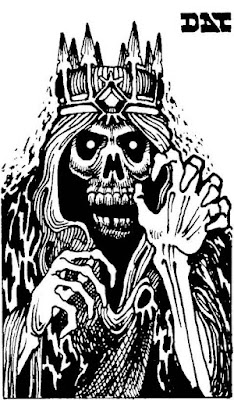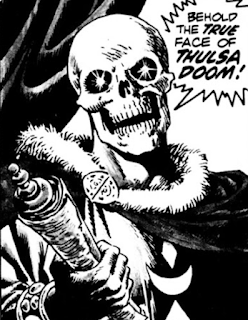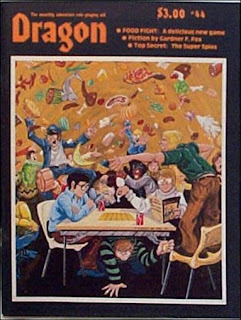Gardner Fox is a name that doesn't get mentioned very often by pulp fantasy aficionados these days, which is odd considering both how much he wrote and how influential his writings were. Fox may be better remembered in the comics world, where he was responsible for creating (or re-imagining) not only some of its best loved characters but also some of its key concepts . Among Fox's many contributions to comics are: Sandman (the original one, not the angsty Neil Gaiman version), The Flash, Hawkman, Dr. Fate, the Justice Society
and Justice League of America, and the very idea of a multiverse of parallel worlds, as well as many others too numerous to mention (though you should feel free to do so in the comments below).
Fox was a energetic polymath, who wrote widely over five decades, from the 1930s to the 1980s, with some of his work even appearing in the pages of
Dragon. And while his comics work is not only better known but better regarded, I think it criminal that his swords-and-sorcery work is mostly forgotten. Take, for example, his character of Kothar, who made his debut in a 1969 collection entitled,
Kothar, Barbarian Swordsman, one of whose stories, "The Sword of the Sorcerer," I'll be discussing in this entry. On first glance, one might reasonably assume that Kothar is just another Conan knock-off, and it's true that there are many similarities between Robert E. Howard's Cimmerian and Fox's own barbaric protagonist. Upon reading these tales, though, what one soon discovers is that there's more than a touch of Vance's
The Dying Earth or Smith's tales of Zothique in the Kothar yarns, too.
Kothar, Barbarian Swordsman begins with a prolog, which purports to be an excerpt from
The Lord Histories of Satoram Mandamor, a
Nemedian Chronicles-like framing device that sets the scene:
The Universe is old. Old!
For ten billion years the stars of this, our galaxy, hurtled outward across the gulfs of space. For another billion years they hung suspended at the apex of their expansion.
During the past three billion years, now that the universe is contracting instead of expanding, those stars, dim and faint with age, have been collapsing in upon themselves, rushing headlong back to their beginnings and their ultimate destruction.
In time, there will be no Time.
Ages ago, as the legends say, the race of Man knew those stars and all their planets, named and visited them, and left on those planetary surfaces vast cities, great monuments to mankind's own greatness. Once, uncounted millennia before, an empire of Man was spread throughout the universe. This empire died more than a billion years ago, after which man himself sank into a state of barbarism.
Here and there on a planet man has occupied can be seen a bit of stonework which he left behind him as a reminder of past glory, or a few rocks of what had been a mighty megopolis, even some chunks of marble as a memento of forgotten art masterpieces. The rust and erosion of eon upon eon has bitten deep into mankind's creations.
Today, wherever man can be found on the planets of the dying star-suns, the very shapes of the continents on which he lives bear little resemblance to those he knew two billion years before. The oceans cover his cities, the desert sands his tombs and temples, while the fierce north wind ruffles vegetation that earlier man had never seen.
Today, man is a barbarian in a barbaric world. Man has reverted back to the childhood of his earliest years. He has forgotten his heritage, he has made new gods to replace the old. Man has outlived his glory.
And yet—to some men and women who live in the sunset years of the race has been given a power unknown to those men of an earlier age, yet a power famed and feared in the legendry of his people. For there are wizards and warlocks, sorcerers and witches in these days, and their spells and incantations are known to work malignant miracles.
There are also warriors, fighting men whose swords earn them fame and fortune, men inured to hardship and a way of life totally alien to the men of an earlier day. One such warrior was Kothar, cast up by the sea in the northlands of his world, a sellsword and a mercenary, a wencher after the women of his day, a freebooter and a thief, at times, whose sword Frostfire was a magic sword.
This is his saga…
This isn't the stuff of great literature, I won't deny, but there's nevertheless a certain raw power in it that I find appealing. Apparently Gary Gygax did as well, since, reading through "The Sword of the Sorcerer," there are a number of cases where one can see ideas that were lifted from it and incorporated into
Dungeons & Dragons. Chief among these is that of an undead wizard called a lich. In Fox's story, Kothar is exploring an ancient tomb that turns out to be the final resting place of a lich named Afgorkon, whose countenance sends lesser men fleeing in fear. As it turns out, Afgorkon has been awaiting Kothar -- or at least someone like him -- to undertake a task for him.
This task is the destruction of a witch-queen and, to aid him in this, he gives to Kothar a magic sword called Frostfire. After he completes this task, Frostfire is Kothar's to keep as his fee, so long as he forsakes all other wealth, a condition Kothar considers no great burden seeing as he owns nothing but his armor and his weapon. And with that the barbarian sets off in a series of journeys that take him from one place to another as he strives to do as Afgorkon commanded him, even as he must grapple with new information that suggests he wasn't told the whole truth by the undead sorcerer.
As I said, "The Sword of the Sorcerer" is not great literature. Indeed, it comes across as more than a little ham-fisted at times, almost descending into parody. Yet, Fox's great strength as a writer as his ideas and those ideas are potent enough that I find it difficult not to enjoy the adventures of Kothar. The mixture of fantasy and science fictional elements with Howardian action in a
Dying Earth-style setting is fun, a bit like a slightly more grown-up version of
Thundarr the Barbarian -- but only slightly. And in my book that's a good thing.



















